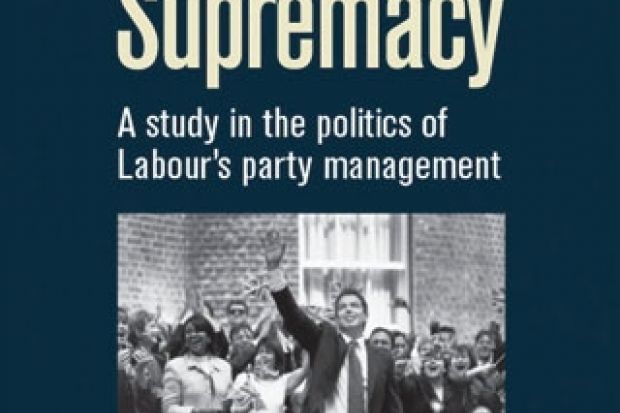This is the real inside story of the most recent Labour government. It is not the story of the Iraq War (we await Sir John Chilcot’s verdict on that) or the story of the Brown/Blair wars, or even of the spin and trickery – all that is now on the record. This is the story of how Tony Blair and the New Labour team took over the party and turned it into what Lewis Minkin describes as a “managerised party”.
I am sure that Minkin would not be offended if I called him a Labour Party institution. His works The Contentious Alliance: Trade Unions and the Labour Party (1991) and Labour Party Conference: A Study in Intra-Party Democracy (1980) would alone mark him out as the academic most equipped to set out the real history of Labour under Blair. But his new book is arguably even more valuable than its predecessors, because for many years Minkin has been advising Labour leaders and the party’s national executive on governance issues. He knows where the New Labour bodies are buried, and in this magisterial work he methodically and remorselessly sets about digging them up.
He begins his exposition with Blair’s mission. Not the one about creating a party that was “more open and democratic than ever before”, as he told The Observer in 1996, but the one that according to Minkin was “governed by persistent subordination of procedural values to management” – a process that the author describes as “the rolling coup”; a coup that sought to transform or corrupt (choice of words dependent on political perspective) party managers from a group of committed civil servants to a team that saw delivery of the Blair mission as its essential focus. And if that meant changing or tearing up the rulebook (again the word choice is contingent), then so be it.
The mantra of New Labour, Minkin tells us, was “what works”. This sounds harmless enough, even anodyne, but how far was it from the Leninist doctrine of “the ends justify the means”? They didn’t – either in Bolshevik Russia or as practised by the denizens of New Labour. Anyone doubting the truth of this need only read the hair-raising memoirs of Gordon Brown’s arch-spinner, Damian McBride. But the irony of the Blair hegemony is that while in electoral terms he became Labour’s most successful leader ever, his ambition to transform the party was doomed to failure. Minkin notes that while Blair comfortably won the leadership election in 1994, even then he had only a narrow base of committed supporters, and that remained the case throughout the 13 years of his leadership.
Blair’s failures, Minkin reminds us, included his inability to turn the party into one that had the same relationship with business as it did with the trade unions; his failure to control the media instead of being consumed by them; and his thwarted attempts to impose his own choice of candidate for mayor of London and first minister of Wales. And fatally, Minkin argues, Blairite party managers became blinded by their own apparent success, and as a result failed to put into place an effective mechanism for dealing with the process of succession. Without an agreed process in place, Blair’s career, as Enoch Powell observed of the careers of most politicians, ended in failure.
Despite his protestations to the contrary, Brown maintained the Blair culture of “command and control”. How could he not? He was, after all, one of its co-authors. Minkin is slightly more hopeful about the prospects for Labour as a democratic party under Ed Miliband, despite the fact that Miliband has undertaken a courageous or foolhardy (again, delete as appropriate) attempt to unhook the party from its “contentious alliance” with the trade unions, without unhooking it from the union funding on which its survival depends. However, an analysis of the success, or otherwise, of this latest New Labour project must await the next instalment in Minkin’s fascinating and illuminating journey through the archaeology of Labour’s underworld.
The Blair Supremacy: A Study in the Politics of Labour’s Party Management
By Lewis Minkin
Manchester University Press, 864pp, £90.00 and £26.99
ISBN 9780719073793 and 3809
Published 16 June 2014
Register to continue
Why register?
- Registration is free and only takes a moment
- Once registered, you can read 3 articles a month
- Sign up for our newsletter
Subscribe
Or subscribe for unlimited access to:
- Unlimited access to news, views, insights & reviews
- Digital editions
- Digital access to THE’s university and college rankings analysis
Already registered or a current subscriber? Login





